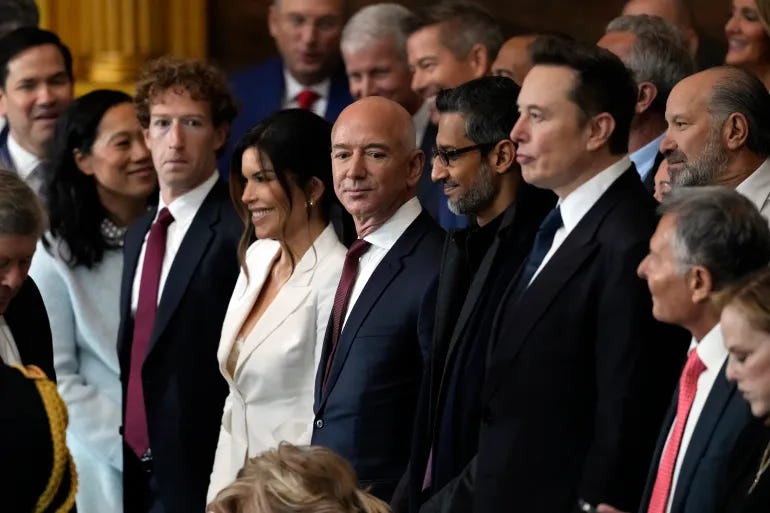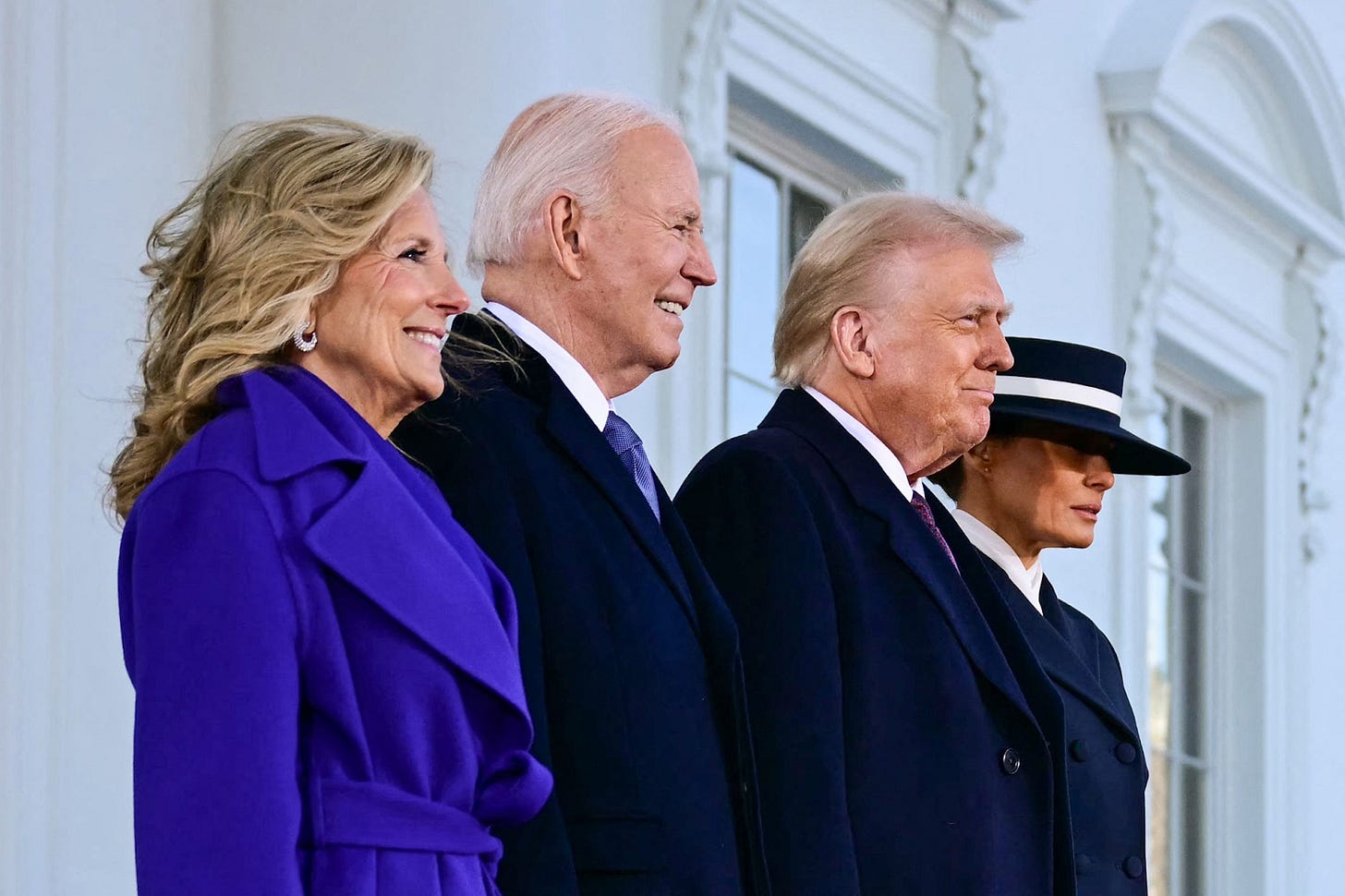Monday, July 20, 2025, was a cold day that began and ended with poorly considered presidential pardons. Donald Trump had no sooner sworn to uphold the Constitution than he pardoned 1,500+ January 6 insurrectionists who had violently stormed the Capitol to overthrow a free and fair election. To the dismay of cops and even a few Republicans, Trump put “our people” ahead of law and order. Many of the “political prisoners” Trump pardoned plan to use their notoriety to carry guns and intimidate those who prosecuted them. More than fifty plan to run for office.1 Fun times.
The tragically diminished Joe Biden was in no position to protest. He began the final day of his presidency by issuing preemptive pardons to anyone named Biden, along with Lynn Cheney and Anthony Fauci, who stood accused of no criminal wrongdoing. By the time he finished his final White House breakfast, Biden had all but conceded Trump’s view that the pardon power of the American presidency is a racket for protecting friends. Unlike his tormentor however, Biden is capable of shame, so he did not reveal his lame-duck pardons until he was packed for vacation to Solvang, California — the pea-soup capital of America.
Perhaps we should thank Biden for not launching a shitcoin on his way out the door. The day before he promised to protect and defend, Trump unveiled a pair of meme coins that skyrocketed in value and earned him billions of dollars on paper. Dubbed $TRUMP and $MELANIA, the tokens are a Solana-based cryptocurrency that serve no economic purpose but are a clever vehicle for fans, sharks, and favor-seekers. Trump owns about 80% of the meme coins, a share worth about $30 billion as of Thursday afternoon.
Who buys these things? According to Chainalysis, most holders are small, individual investors with less than $100 worth of coins in their wallets. Nearly half created their wallets just to buy Trumpcoins. About 60 “whales” have each made more than $10 million on the coins. This is not quite record levels of corruption – but it would be if Trump could sell his stash without devaluing it (he cannot.)2
Tech Tribunes

The inauguration offered another spectacle: America’s wealthiest men occupying front-row seats as elected governors and most members of Congress were consigned to overflow space. These were not the heads of the manufacturing companies that Trump promised to place at the center of his economic agenda. There was not a Ford, GM, or US Steel CEO in sight.
As Ezra Klein pointed out, Democrats assume that the worthies of Silicon Valley were there because they were rich.3 More likely, Trump is focused on using them to help capture attention, which, more than most politicians, he understands as a valuable and rapidly evolving commodity. Trump craves the attention that only Meta, Google, and X can deliver: immediate, memetic, and viral (as opposed to well-researched, fact-checked, and sober).
Plainly, money matters in politics; Trump presumably appreciated Elon spending $277 million to help him carry all seven swing states. But money matters much more in low-attention, often local, races. High-profile, attention-rich races are increasingly won by people who understand how to capture and manage attention. National candidates like Kamala Harris or Joe Biden who can raise money without consistently commanding popular attention have little political future. Just as politicians who could leverage radio, TV, and online advertising thrived in earlier political ages, those who can control attention-based social media now shape our politics.
In his forthcoming book, Chris Hayes develops a provocative analogy. The Industrial Revolution transformed work by embedding labor in markets and surrounding it with institutions. The ability to sell work to an employer at a known price transformed social, political, and economic relations. It changed the way we experienced life.
Something similar is now happening with attention. Today, our attention is valuable, especially as aggregated and commodified by Meta, X, or Google. Elon Musk and Donald Trump pursue attention relentlessly and excel at capturing its value. (Whether they do this because of some howling personal void or because they are strategically savvy is beside the point.)
Artificial intelligence will increasingly shape, define, and arbitrate attention, further entrenching its value as a market commodity that technology companies control and monetize. Once again, it will change our economics, politics, and experience of life. Trump is this century’s most important politician because he grasps this.
The Politics of Attention
Attention isn’t free. Evidence continues to mount that social media produces not only profound political change, but lasting psychological damage and social isolation. Citizens increasingly demand a public policy response. Three ideas are simple, worth considering, and have bipartisan potential.
Ban TickTok. Because Congress could not find a good reason to give the Chinese Communist Party a way to track the personal details and locations of half of all Americans, it decided to force it to find a new owner or shut down. Trump must either enforce this law or expose his true loyalties.
Keep phones out of schools. Teachers and students have noticed an improvement everywhere this has been tried. Make it the rule, not the exception. Watch Australia, which just banned social media for children under age 16.
Hold platforms liable. In no other product area do we allow companies to create and promote a product with serious known health hazards. The remedy is straightforward: limit the liability of social media platforms only to accounts that a user follows. Rescind Section 230 protection and hold platforms strictly liable for all content they promote, whether by algorithm or advertising. If a platform promotes content, it has effectively published the content and needs to be liable for any damage that results.
Welcome to the start of a chaotic four years. Not everything Trump does will be terrible (I welcomed his executive orders neutering the Environmental Quality Act, which NIMBYs have weaponized for decades to keep us from building). But Trump is certain to overreach and to severely damage American institutions and values along the way. It will be a bumpy flight. Best to keep seat belts fastened and tray tables in their upright and locked position.
Trump, whose instinct for corruption rarely fails him, used his earlier pardon power exactly as our founders feared a tyrant would. He pardoned Paul Manafort and Michael Flynn, who were both implicated in the Mueller investigation into Russian interference in the 2016 election. He exonerated Steve Bannon and Dinesh D’Souza for fundraising fraud. He gave proudly racist Arizona sheriff Joe Arpaio a get-out-of-jail-free card.
Historians debate the most corrupt leader in modern history. Vladimir Putin has reportedly transferred $200 billion to Swiss bank accounts. Some award the top prize to Indonesia’s Suharto, who embezzled between $15 and $35 billion of his countrymen’s funds. Honorable mention goes to Ferdinand Marcos (Philippines, $7.5 billion) and a series of $5 billion pikers, including Ukraine’s Victor Yanukovich, Najib Razak of Malaysia, and Mobuto Sese Seko of Congo.




That first sentence should contain "January" not "July." Autocorrect, I'm sure. Best...